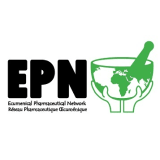
In 1981, the Christian Medical Commission (CMC) of the World Council of Churches (WCC) assigned a pharmaceutical adviser to provide technical support in the area of pharmaceutical technical support to church health programmes in Africa. Later in 2000, the supported church health organizations jointly agreed to become a Network through membership. The Ecumenical Pharmaceutical Network (EPN) was then registered as a non-profit organization with a secretariat based in Nairobi, Kenya.
The Network
Today, EPN is a Christian non-profit organization comprising of over 100 members of healthcare providers and professionals. The majority of our members are Faith-Based Organizations (FBOs) that provide healthcare to communities in the most marginalized and remote areas where national government health services are limited. EPN has 20 Church Health Associations (CHAs) and 23 Drug Supply Organizations (DSOs), 28 Church Health Institutions (CHIs), 31 Individual members and 11 other organizations, making a total of 115 members spread over 37 different countries (*as of 2018). More than 300 million people rely on health care provided by our Network.
Vision
A valued global partner for just compassionate quality pharmaceutical services for all.
Mission
To support churches and church health systems provide and promote just and compassionate
quality pharmaceutical services.
Why church health facilities?
Church-based organizations are active in health care delivery in many parts of the world and specifically, in Low- and Middle-Income Countries (LMICs) which tend to be in the most hard to reach places. It is estimated, in many African countries, that church health facilities and faith-based pharmaceutical suppliers cater for over 40% of people living in rural areas. Church health institutions tend to bridge the healthcare services gaps left by the government and private sectors.
These church health institutions often struggle to recruit, train and retain health workers due to their location and low resource availability. Further, church health facilities tend to be overlooked by governments when allocating financial and medical commodities during national budgeting. Therefore, such facilities tend to operate with inadequate resources because their allocation comes from the Church and the generated revenue. Even with low resources, church health institutions tend to the medical needs of thousands of people sparsely settled and often the only health facility for miles.
Why quality pharmaceutical services?
Medicines are a cornerstone of many medical treatments and disease prevention. Access to quality-assured medicines and its rational use remains a big problem. EPN seeks to work with church systems to ensure that their pharmaceutical services are efficient and effective and are equipped to ensure the availability of affordable quality medicines to all who need them.


